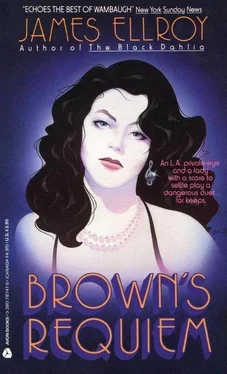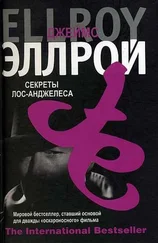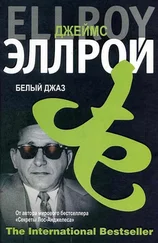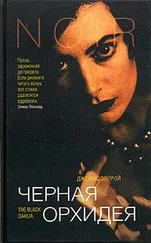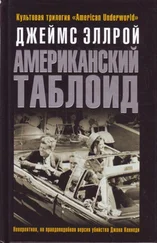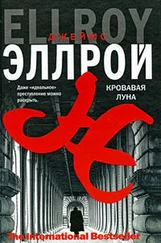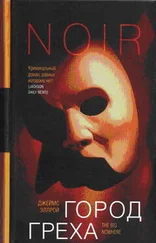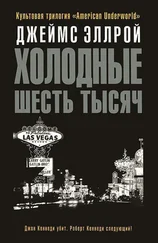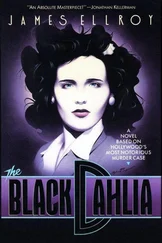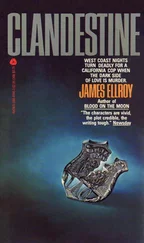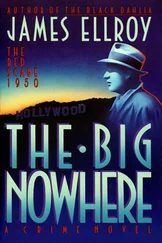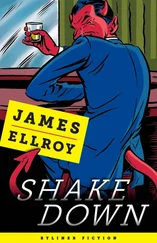The women in the photographs were uniformly ugly and pathetic looking, except one. She was an Anglo, about 17 or 18, with high firm breasts and a red natural. She was performing with men, not animals, indicating a higher status.
I tore half a dozen of the pictures from the walls and stuffed them into my jacket pocket. It was broiling in the room, and I suddenly realized I was drenched in sweat. Before I left I tried a con job. Since there was no way to cover my tracks, I tried to put the blame on some local punks. Maybe Fat Dog would fall for it. I pried open a can of paint, found a brush and painted “Death to honkys,” “Crips Rule,” and “Criplets Venice” on the outside wall near the door. Then I ripped more photos off the walls, threw them on the floor and dumped the can of paint on top of them. I left the door open and split for the car, hoping no one would see me. I had myself a real case now.
I went looking for a telephone. In Venice that takes some doing. Pay phones are easy prey for Venetian junkies and the first three I checked out had been gutted. I finally found one that worked and called Mark Swirkal’s office. Swirkal runs an attorney service, delivering writs and summonses and filing court papers. He knows the L.A. court system from every angle and can locate any official paper within a matter of hours. He had hired me a few times to serve summonses to hardcase types, and now I was shooting him some business in return.
I told him what I wanted. The Club Utopia firebombing case: the names of the victims, the name of the owner and his last known address, the names of the cops who made the arrests, the name of the insurance company and agent who serviced the claim, and, most importantly, notes on all testimony pertaining to the alleged “fourth man.” I promised him a C-note and told him I would call back in four hours. He hung up, chomping at the bit.
I walked across the street to a burrito joint, and scarfed up an enchilada plate and coffee. My head was reeling with the implications of what I had just learned. It gave me a headache, so I got some Excedrin out of the glove compartment and chased four of them with coffee. Somehow my mind quieted. My speculations would be futile until I talked to Mark Swirkal. But one theme emerged: I wanted it to be Fat Dog, for the sake of my own revenge. The L.A.P.D. with its overblown reputation blows a big time, highly publicized murder case only to have it solved years later by a former flunky cop they forced to resign. Almost reflexively I sized myself up in the full-length mirror at the back of the restaurant. My appearance was inconclusive: an outsized thirty-three-year-old man, neither handsome nor ugly. Personal qualities and morality open to interpretation.
I had three-and-a-half hours to kill before calling Swirkal, so I got the car and went cruising. I drove by Kupferman’s fur showroom, and saw his car parked in front. Relieved, I drove by his big house north of Sunset. CELLO-1 was parked in the driveway and faint cello chords drifted toward me across the broad front lawn. I stopped my car to listen and threw Jane Baker my silent resolve: that as long as I was around, no one would hurt her or her benefactor. I decided to go see Mark Swirkal in person.
Mark’s office was in a dingy turn of the century building on 6th and Union, just outside downtown L.A. proper and close to all the midtown courts. The building had been ruled unsafe after the big ’71 earthquake, but never condemned. Mark loved to save a buck and the attorneys he worked for didn’t care where he hung his hat; he was the fastest process server and courthouse bulldog in L.A.
I took a rickety elevator to the third floor. His waiting room was open and sparsely furnished — two folding metal chairs with Harbor General Hospital stenciled on the back and a stack of Playboys and Good Housekeepings on the floor. I opted for a Playboy .
Swirkal showed a few minutes later and led me into his office, which was smaller and more cluttered than mine, and not air-conditioned. We shook hands, then he opened his window and his mouth. Mark talks very fast. “I got what you wanted, Fritz. More or less. The trial was short so the transcript was short, first off...” Mark waited while I got out my notepad and pen. “First off,” he continued, “the Club Utopia was insured. The agent who sold the policy also investigated it for the company, Prudential. His name is James McNamara. The victims’ names were Philip Crenshaw, Henry Hadwell, Jacqueline Gaffany, Anthony González, William Eastero, and Margot Jackson. You got that, Brownie?”
I caught up with him. “Keep going,” I said.
“Okay. The arresting officer was Detective Lieutenant Hay-wood Cathcart, 77th Street Division. Now regarding the so-called fourth man. He was described as ‘a short fat guy, kind of grubby... a red-faced man in his late twenties... fat and mean looking... but no wimp. He had on one of those little tennis shirts with the crocodile on the pocket.’” Fat Dog. Eureka. Salvation. Mark went on talking, but I didn’t hear a word he was saying. Finally, he stopped. “What’s the matter, Brownie? I got lots more testimony on the fourth man.”
“Skip it. I’ve got enough.”
“Are you okay? You look pale.”
“I’m fine. Tell me about the owner of the Utopia.”
“Okay. His name is Wilson Edwards. There was no mention of his address in the transcript.”
I gave Mark Swirkal a big nervous smile and handed him two of Fat Dog’s fifties. “Good work, Daddy-O,” I said.
Mark stuck the money into his pocket. “You want to tell me what this is about?” he asked. “The Utopia bombing is a dead issue.”
“I can’t now. Someday I will, though. Right now, I’d like to use your phone.”
“You go right ahead. I’ve got to split. Lock the door behind you.”
“I will.”
We shook hands again, then Mark thanked me and gave me a puzzled look as he headed out the door. When I heard him get into the elevator I let out a giant whoop of joy and reached for the telephone.
I called Prudential Insurance at their main office on Wilshire. Yes, James McNamara still worked for them. No, he was not in at the moment. I convinced his secretary to relinquish his home phone number. He answered on the second ring. I told him I was a writer doing a book on famous Los Angeles crimes. Would he consent to an interview on the Utopia case? He would indeed. He sounded almost eager. We agreed to meet at a restaurant near his home in Westchester at eight-thirty tonight. When I hung up I let out another whoop of joy, this one even louder.
I pulled into the parking lot of the steakhouse on Sepulveda at exactly eight twenty-five. I inquired after McNamara with the maitre d’, and he pointed out a large man drinking alone at the bar. I walked up and introduced myself. McNamara grasped my hand warmly. He had the lonely, desperate look of a brother juicehead hungry for company. I judged him to be in his late forties, and about a quarter of the way drunk. We adjourned to a table, where I laid out a spiel about the book I was writing. When our waitress came, he ordered a double martini and opened up.
“The Club Utopia firebombing was the ugliest thing I’ve ever seen,” McNamara said. “I went all through Korea with the infantry company and saw nothing to compare to it. The fire itself was no big deal. It was out by the time I got there. It was the bodies that were so terrifying. They were roasted beyond recognition and swollen up like pork sausages. There was a liquor store that was still open down the street, and there was a big crowd of rubber-neckers hanging around, guzzling out of paper bags. When the stiffs got carted out and the smell hit, there was a regular epidemic of puking. Booze puke all over the street and the smell of those bodies. Jesus.”
Читать дальше
